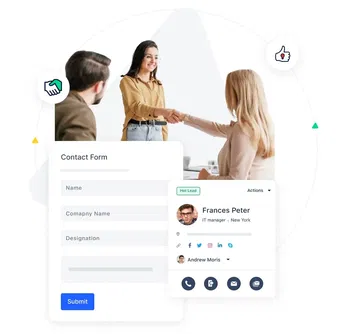Why you should consider Salesmate as your recruitment CRM?
Whether you’re leading recruitment in a business with a team or you’re a hiring agency, Salesmate has everything you need to efficiently recruit the best talent!
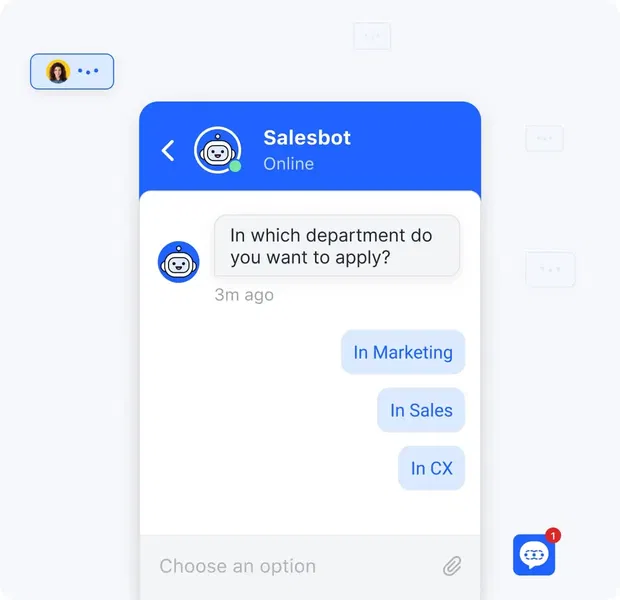
Bring in new applications automatically
- Set-up an automated chatbot to drive applicants to the
right opening landing pages - Use custom forms to collect new applications or leads
for your agency - Connect Salesmate with external sources to collect new
applications or new leads via Zapier - Bring fresh entries right into your CRM!
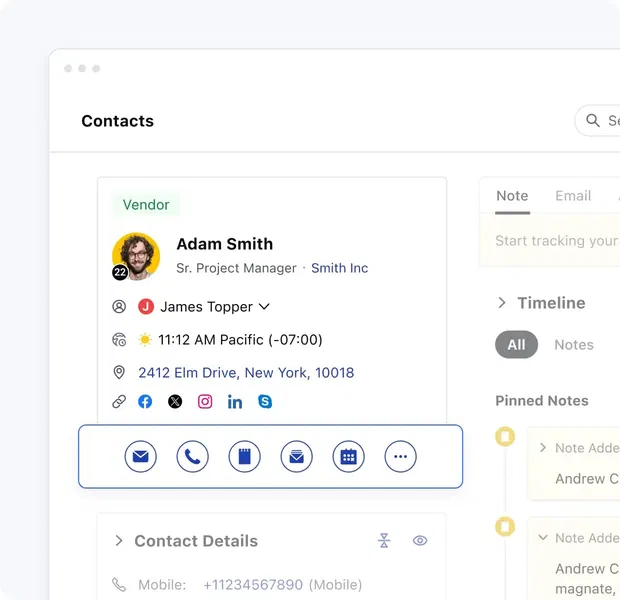
Connect with applicants & clients from CRM
- Make calls with built-in phone system
- Sync your emails in Salesmate and manage your entire inbox!
- Send text messages to applicants or clients without leaving
Salesmate - Book interview calls & client meetings right from Salesmate’s Meeting Scheduler
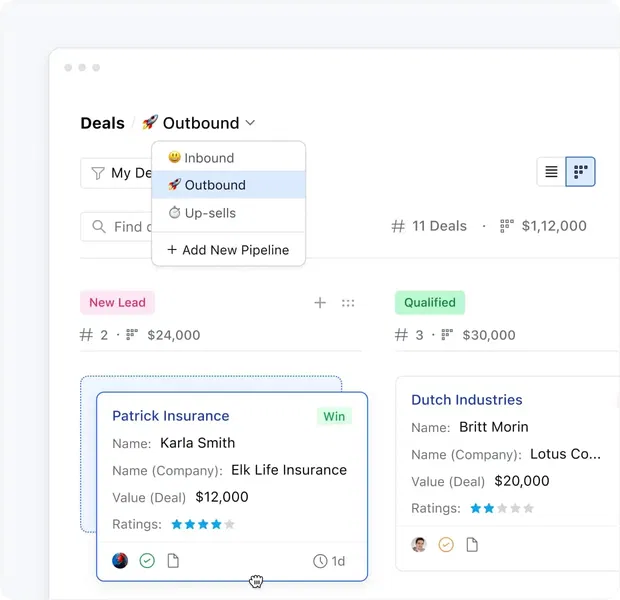
Unlimited pipeline, unlimited deals!
- Maintain separate pipelines for applicants and clients
effortlessly - Customize every stage of the pipeline as per your
choice! - Manage unlimited deals in drag & drop Kanban board
- Customize deal cards and make it more personalized for your workstyle!
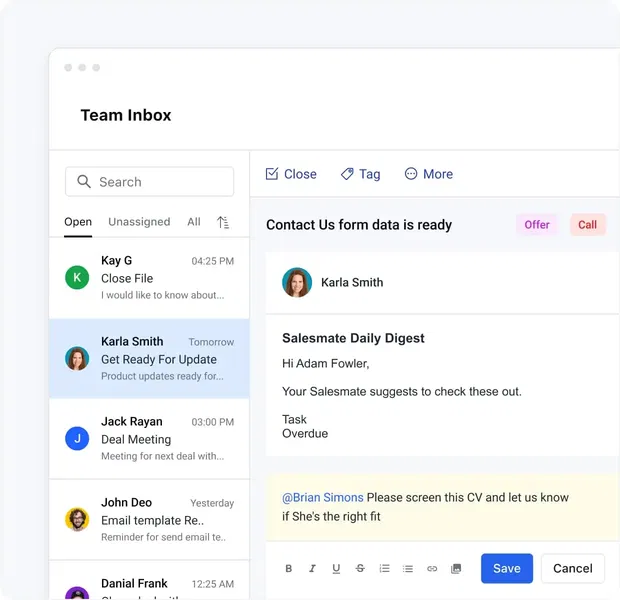
Work together with top-notch efficiency
- Manage common inboxes like career@company.com from a
common inbox using Shared Inbox - Follow & assign conversations. Guide your teammates with
personal notes - Assign tasks to your teammates with Workflow Automation
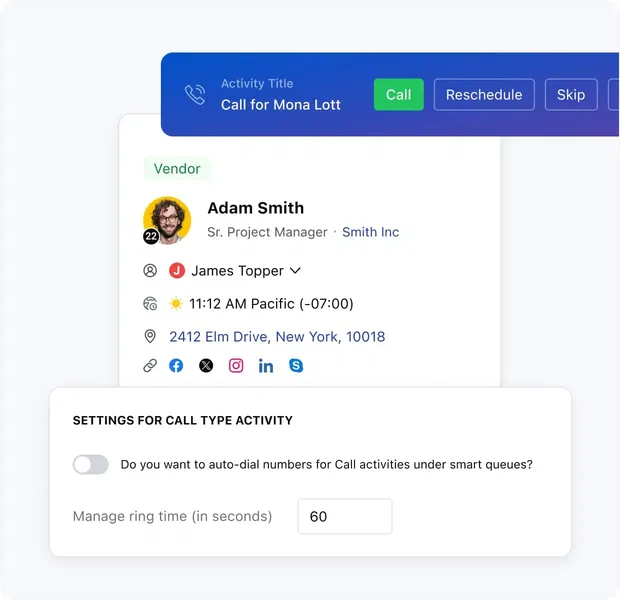
Why do it when you can automate!
- 2X your calling efficiency with Power Dialer
- Use Sequences to take automated email or text follow-up
based on your preferred timezone - Craft re-usable email templates with drag & drop email builder
- Build & execute high-quality campaigns in minutes using Automation Journeys
- Evaluate candidates or score leads with custom Salesmate Score
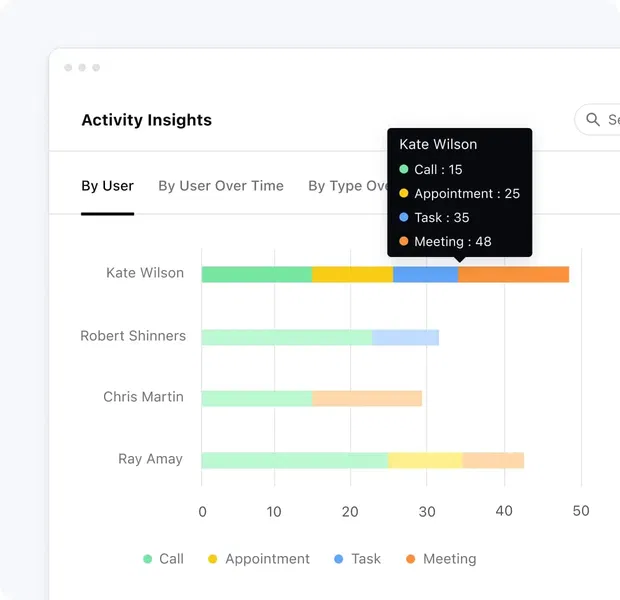
Insights that can take your processes up a notch!
- Custom Dashboard for the data you want to see first thing in
the morning - Create crucial reports in just a few clicks!
- Use premade widgets and report templates to supercharge
your work - Insight on marketing campaigns and sequences for every
step!
Top rated across all platforms
Customers have rated us the best compared to any other software across review platforms like G2, Gartner, TrustRadius.
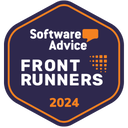
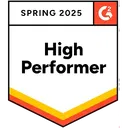


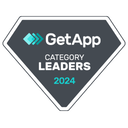
Got questions? Find answers!
1. What does CRM stand for in recruiting software?
CRM in recruiting software stands for customer relationship management. It provides an integrated approach to tracking and managing interactions with potential candidates and clients, streamlining the process of filling vacancies quickly and efficiently.
Having all relevant recruitment pipeline in one place allows recruiters to easily identify opportunities, track progress, and measure results.
2. Why do you need CRM for recruiting?
Recruitment CRM software is essential for various reasons:
1. Efficient management of candidate data:
With the best recruitment CRM, you can centralize all candidate information, ensuring comprehensive candidate profiles are easily accessible and manageable.
2. Tracking communications:
Whether it’s through job boards, social media platforms, or direct emails, a recruitment CRM ensures all interactions with potential and qualified candidates are logged and retrievable.
3. Automation of tasks:
From interview scheduling to posting on popular job boards, recruiting CRM software automates routine tasks, streamlining the recruitment processes.
4. Enhanced candidate experience:
A CRM for recruitment agencies ensures candidates, both active and passive, have a seamless experience from job posting to interviews.
5. Data-driven decisions:
With detailed reports and analytics features in recruitment CRM systems, you can make informed hiring decisions based on real-time data.
6. Future-proofing recruitment:
CRM software for recruiting helps in building talent pools, ensuring a continuous flow of potential candidates for future hiring needs.
7. Recruitment marketing tools:
Modern recruitment CRM software often comes with tools to enhance your recruitment marketing efforts, reaching out to candidates on various platforms.
8. Integration with other tools:
The best recruitment CRM system integrates seamlessly with applicant tracking systems, communication tools, and other software solutions, enhancing the entire recruiting process.
3. How to use a CRM for recruiting?
CRM can help recruiters to create an effective recruitment process. It allows them to:
- Identify and prioritize the best candidates for a vacancy
- Track missing documents or information from applicants
- Schedule and track interviews in one place
- Establish stronger candidate relationships during the process
- Send automated emails to keep the candidates informed
- Retain data from unsuccessful applicants for future reference
By using a recruitment CRM, recruiters can save time and money while ensuring a smooth hiring process. It makes finding qualified candidates easier and keeps all their data organized in one place.
This not only facilitates the recruitment process but also enhances the hiring procedure. With the right recruiting CRM in place, recruiters are able to access all of their data quickly and easily.
4. How can a CRM for recruitment agencies help find the best candidates?
CRM for recruitment agencies helps to identify and prioritize the best candidates. In order to find candidates who meet their requirements, recruiters can search through a database of potential hires.
By using filters such as industry experience, qualifications, and skillset, recruiters can quickly narrow down their list of possible candidates.
Recruitment CRMs also help to create a better candidate experience. Automated emails can be used to send out relevant information, such as job descriptions, interview dates and times, or company updates.
This helps to keep candidates engaged throughout the process and creates an efficient and enjoyable user experience.
In addition, CRMs provide the tools to measure a recruitment agency’s performance. Recruiters can use this information to discover problems and create future success plans.
Using a recruitment CRM allows agencies to streamline their hiring process, quickly find the right candidates, and create an improved candidate experience. This ultimately leads to better results and more successful hires in the long run.
Overall, a recruitment CRM is essential for any recruitment agency looking to find the best talent and efficiently manage its hiring process. With the right features and data management capabilities, recruiters can quickly identify qualified candidates and track progress throughout the recruitment process.
This leads to better outcomes and improved results in the long run. With recruitment CRM, agencies can save time and money while ensuring a smooth and successful hiring process.
5. What are the features of recruiting CRM Software?
Recruiting CRM software offers a comprehensive suite of features designed to streamline and enhance the recruitment process.
Here are the essential features that make recruitment CRM systems indispensable for recruitment agencies, in-house recruiters, and consultants:
1. Data management capabilities:
Recruitment CRM software centralizes all candidate information, ensuring comprehensive profiles are easily accessible and manageable. It includes candidate tracking and resume parsing to streamline data entry.
2. Interview scheduling tools:
Automates the scheduling of interviews, sending invites and reminders with just a few clicks. This ensures candidates and hiring managers have synchronized schedules, minimizing conflicts.
3. Performance tracking:
CRM recruitment software provides detailed analytics and reporting features to measure key performance indicators (KPIs) and develop successful hiring strategies.
4. Application capture:
Integrates with job boards and candidate sourcing platforms to capture applicant information directly into the CRM, reducing manual data entry and errors.
5. Pipeline for managing multiple clients and positions:
Allows the creation and management of multiple pipelines for different clients and job openings, providing a visual representation of candidates’ progress through the recruitment process.
6. Retain data from unsuccessful applicants:
This helps recruiters save time by storing information about unsuccessful applicants in a database for future reference.
7. Communication channels:
Includes built-in tools for emails, calls, and text messages, enabling recruiters to stay in constant contact with candidates. Integration with social media platforms enhances candidate engagement.
8. Automation features:
Automates routine tasks such as follow-up emails, reminders, and notifications, reducing tedious manual tasks. Workflow automation helps in task assignment, improving efficiency.
9. Customizable dashboards and reports:
Provides customizable dashboards and detailed reports to gain insights into the recruitment process, such as candidate sourcing and time-to-hire metrics.
10. Integration with other tools:
Seamlessly integrates with applicant tracking systems (ATS) and popular job boards, ensuring a streamlined workflow and efficient data management.
11. Mobile accessibility:
Mobile recruiting features allow recruiters to access candidate information and perform tasks on-the-go, improving flexibility and responsiveness.
12. Enhanced candidate experience:
Improves the candidate experience by ensuring timely communication and feedback, keeping candidates engaged and informed throughout the recruitment process.
13. Collaboration tools:
Features like shared inboxes and a drag and drop interface enhance team collaboration, ensuring the entire team is on the same page.
14. Data security and privacy:
Recruitment CRM systems ensure candidate data is protected through robust security measures and compliance with data protection regulations like GDPR.
6. What are the benefits of recruiting CRM Software?
Recruiting CRM software offers numerous advantages that significantly enhance the recruitment process for recruitment agencies, in-house recruiters, and consultants.
Here are the key benefits explained:
Streamlined hiring process:
Recruitment CRM software simplifies and speeds up the process of finding and hiring qualified applicants. By automating routine tasks such as resume parsing, interview scheduling, and communication, recruiters can focus on more strategic activities.
This leads to a more efficient and effective hiring process, reducing time-to-hire and improving overall productivity.
Organized data management:
Recruitment CRM software centralizes all candidate information, ensuring comprehensive profiles are easily accessible and manageable.
With all data in one place, recruiters can quickly find and reference candidate details, improving accuracy and efficiency.
Data management capabilities help keep recruitment data organized, making it easier to track and manage candidate interactions.
Efficient candidate tracking and scoring:
Recruiting CRM software includes tools for tracking and scoring candidates based on their qualifications and suitability for job openings.
This ensures that recruiters can quickly identify and prioritize the best candidates for each position.
Candidate tracking features help streamline the recruitment process, improving the chances of making successful hires.
Improved candidate experience:
Recruitment CRM software enhances the candidate experience by ensuring timely and personalized communication throughout the recruitment process.
Automated emails and messages keep candidates informed and engaged, providing a seamless and positive experience.
A better candidate experience leads to higher satisfaction and a greater likelihood of candidates accepting job offers.
Increased efficiency:
Recruiting CRM software automates many tedious manual tasks, freeing up recruiters’ time to focus on more strategic activities.
Features like workflow automation, interview scheduling, and resume parsing help reduce administrative burden and improve overall efficiency.
Automation features streamline the recruitment process, allowing recruiters to handle more candidates and job openings simultaneously.
Better insights and data-driven decisions:
Recruitment CRM systems provide detailed reports and analytics that offer insights into various aspects of the recruitment process.
Recruiters can track key performance indicators (KPIs), measure campaign effectiveness, and identify areas for improvement.
Data-driven decisions enhance the recruitment strategy, leading to better hiring outcomes and more effective talent acquisition.
Future-proofing recruitment:
Recruitment CRM software helps build and maintain talent pools, ensuring a continuous flow of potential candidates for future hiring needs.
This proactive approach to candidate sourcing ensures that recruiters always have access to a pool of qualified candidates.
Recruitment CRM systems support long-term recruitment strategies, making it easier to respond to changing business needs and market conditions.
Enhanced recruitment marketing:
Recruiting CRM software includes tools for creating and managing recruitment marketing campaigns.
Automated marketing features help reach potential candidates across various platforms, including job boards and social media platforms.
Recruitment marketing capabilities enhance the visibility of job openings and attract a broader pool of candidates.
Integration with other tools:
Recruitment CRM software integrates seamlessly with applicant tracking systems (ATS), communication tools, and other recruitment platforms.
This ensures a streamlined workflow and efficient data management across all stages of the recruitment process.
Integration with popular job boards and other tools enhances the overall efficiency of the recruitment team.
Scalability and flexibility:
Recruitment CRM software is designed to scale with the growth of recruitment agencies and in-house recruitment teams.
Flexible features and customization options ensure that the CRM can adapt to changing business needs and recruitment strategies.
Scalability ensures that the recruitment process remains efficient and effective as the organization grows.
7. How to choose the best recruiting CRM software?
Choosing the right recruiting CRM software involves evaluating several critical factors to ensure it meets the specific needs of your recruitment agency or in-house recruitment team. Here are some key considerations to guide your selection process:
Understand your business needs:
Determine the specific requirements and challenges in your recruitment process. Consider whether you need features focused on candidate sourcing, relationship management, or recruitment marketing. Assess the volume of candidates and clients your organization handles to ensure the CRM can manage this effectively.
Key features evaluation:
Look for essential features such as candidate screening, resume parsing, interview scheduling, and pipeline management. Advanced features like automation, customizable dashboards, and detailed reports for performance tracking are crucial for making data-driven decisions.
User-friendly interface:
A user-friendly interface with a drag and drop interface can enhance usability and reduce the learning curve, increasing adoption rates among your team. Ensure that the interface is intuitive, allowing for easy navigation and task management.
Integration capabilities:
The CRM system should integrate seamlessly with existing tools such as applicant tracking systems (ATS), popular job boards, and social media platforms. This ensures a streamlined workflow and efficient data management. Look for CRMs that offer extensive integration options with other recruitment tools and software you already use.
Mobile accessibility:
Mobile recruiting features enable recruiters to access candidate information and perform tasks on-the-go, which is crucial for flexibility and responsiveness. Ensure the CRM supports mobile devices to allow your team to work efficiently from anywhere.
Customization options:
The ability to customize pipelines, dashboards, and reports is important for tailoring the recruitment CRM to your specific needs. Customization options should allow you to adapt the software to fit your workflow, rather than forcing you to adapt to the software.
Data security and privacy:
Ensure that the recruitment CRM software complies with data protection regulations like GDPR and offers robust security measures to protect candidate information. Data security features are essential to maintain candidate privacy and provide peace of mind.
Customer support and training:
Reliable customer support is essential for resolving issues promptly. Look for vendors that offer comprehensive training resources, including tutorials, webinars, and a support portal. Effective support and training help your team make the most of the CRM’s features.
Trial period and demos:
Take advantage of free trial periods and request demos to evaluate the software’s functionality and ease of use. Testing the CRM in your environment ensures it meets your requirements before making a commitment.
Cost and ROI:
Consider the cost of the recruitment CRM software relative to the features and benefits it offers. Evaluate the potential return on investment (ROI) by assessing how the software can improve your recruitment processes, reduce time-to-hire, and enhance overall efficiency.
By considering these factors, you can choose the best recruiting CRM software that aligns with your business needs and enhances your recruitment process.
8. What kind of automation features do recruitment CRM systems offer?
Recruitment CRM systems offer various automation features such as:
- Automated Email and Text Follow-ups: Sends automated messages based on pre-set triggers.
- Interview Scheduling: Automatically schedules interviews with candidates.
- Application Capture: Integrates with job portals to automatically capture candidate information.
- Task Assignment: Assigns tasks to team members based on workflow automation.
- Recruitment Marketing: Automates marketing campaigns to reach potential candidates.
- Onboarding: Automates the onboarding process for new hires.
9. What is the difference between recruiting CRM and ATS?
The difference between recruiting CRM and ATS (Applicant Tracking System) is:
- Recruiting CRM: Focuses on managing relationships with candidates and clients, enhancing candidate engagement and recruitment marketing.
- ATS: Primarily deals with tracking applicants through the hiring process, managing resumes, and scheduling interviews.
Recruitment CRM systems are more comprehensive, offering tools for relationship management and candidate engagement, while ATS are more specialized for tracking and managing applications.
10. What are the 5 best recruitment CRM software?
In today’s competitive hiring landscape, having the right tools is essential for streamlining the recruitment process.
Recruitment CRM software plays a pivotal role in managing candidate relationships and ensuring efficient hiring. Here are the top 5 recruitment CRM software:
1. Salesmate:
Touted as the best recruitment CRM, Salesmate is specifically tailored to meet the needs of recruitment agencies. It offers comprehensive features that ensure effective candidate management throughout their journey.
2. Recruit CRM:
A popular choice among recruitment agencies, this software offers streamlined job postings and ensures timely interview scheduling.
3. Rippling:
Designed with agencies in mind, Rippling provides robust recruitment software for agencies, focusing on job postings and efficient candidate tracking.
4. Pipedrive:
As a versatile CRM for recruiting, Pipedrive offers a clear view of the recruitment pipeline and integrates seamlessly with other tools.
5. Bullhorn:
Esteemed among large agencies, Bullhorn’s recruitment CRM system prioritizes candidate engagement and provides detailed insights.
11. Why Salesmate is the best CRM for recruitment?
Salesmate is the best CRM for recruitment because it offers a range of features designed to make managing and streamlining the hiring process easier. These include:
- Automated emails: This feature allows recruiters to easily send out automated messages such as job alerts or reminders, saving time and effort.
- Detailed candidate tracking & scoring: This ensures that recruiters can quickly identify and prioritize the best candidates.
- Performance tracking: With Salesmate, recruiters can measure their recruitment performance and develop strategies for successful hires in the future.
- Customizable pipelines & job boards: Recruiters can easily create and customize pipelines for multiple clients and positions.
Intuitive user interface: With an intuitive design, Salesmate makes navigating the platform easy and quickly access relevant information.
